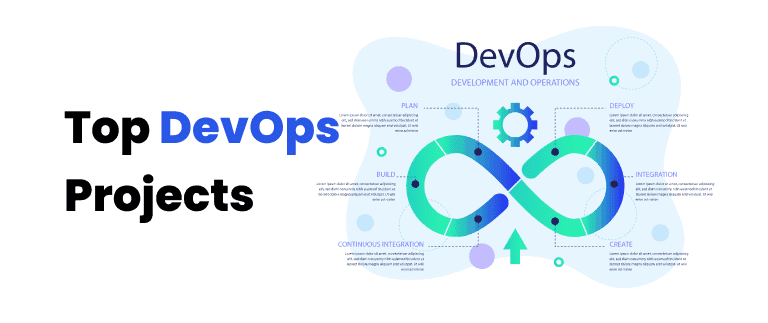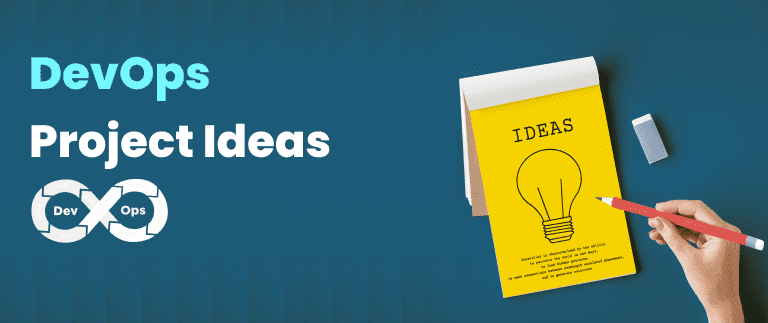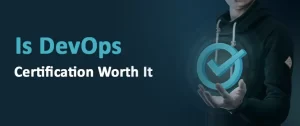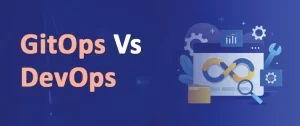DevOps includes practices and principles that focus on collaboration, automation, and seamlessly integrating software development and operations teams. The main goal of DevOps is to shorten the time it takes to develop systems while ensuring the delivery of high-quality software.
To fully benefit from DevOps tools, one must embrace operational philosophies and processes. Engaging in DevOps real-time projects allows teams and individuals to develop skills and successfully implement strategies.
| Table of Contents 1. DevOps Projects: Why Are They Important? 2. Top DevOps Projects to Practise Beginner-Friendly DevOps Projects Advanced DevOps Projects 3. Conclusion |
DevOps projects for practice provide learning opportunities for both beginners and experienced professionals. By working on DevOps projects, you can explore how different stages of the software development lifecycle (SDLC) intersect, gaining an understanding of how all the pieces fit.
This article presents a curated selection of 12 project ideas for both beginner and advanced practitioners in the field of DevOps. Keep reading to discover ways in which you can gain hands-on experience with DevOps concepts through these projects.
DevOps Projects: Why Are They Important?
DevOps projects hold value for individuals seeking to acquire DevOps skills and organizations aiming to adopt DevOps practices. Below are some reasons that highlight the importance of hands-on DevOps projects:
- Learn by doing: While conceptual learning has its merits, there’s no substitute for practical knowledge. Engaging in DevOps projects provides exposure to using DevOps tools and facilitates the acquisition of skills.
- Comprehend SDLC optimization: By participating in projects that span development, testing, deployment, and monitoring phases, you gain insight into how DevOps can optimize the software delivery lifecycle.
- Foster collaboration skills: Collaboration is at the core of DevOps principles, emphasizing teamwork and breaking down silos. Projects enable communication, collaboration, and cross-functional thinking.
- Cultivate a culture of improvement: Undertaking projects inevitably leads to mistakes and failures, which present learning opportunities. This aligns with the ethos of improvement embedded within the realm of DevOps.
- Showcase demonstrable experience: Real-world experience in DevOps holds value for your career growth and for becoming a DevOps Engineer. Working on projects becomes an example of your skills that can be discussed during interviews.
- Enhance tool proficiency: Reading about tools is insufficient; practical experience with CI/CD automation, containerization orchestration, and other critical DevOps technologies is crucial for maximizing tool proficiency.
- Skills in infrastructure as code: Projects provide the opportunity to acquire expertise in provisioning and configuring infrastructure by utilizing code, which is a skill set in DevOps.
- Develop troubleshooting abilities: It is inevitable that issues will arise during projects. The process of troubleshooting these problems helps cultivate the problem-solving skills expected from DevOps engineers.
DevOps projects foster the development of skills. Their hands-on nature makes them an invaluable learning tool for individuals aspiring to become DevOps professionals.
Top 12 DevOps Projects to Practise

Engaging in practical DevOps projects is the best way to develop expertise and expand your capabilities as a DevOps professional. However, it can be challenging to determine which projects are most worthwhile, especially when starting. The key is to strategically select projects that align with your existing skill level and help you progress to the next milestone.
Beginner-Friendly DevOps Projects:
Before diving into complex enterprise implementations, it is wise to start your DevOps journey by developing proficiency in foundational concepts and tools.
- DevOps projects for beginners that are focused on core knowledge areas like containers, automation, infrastructure provisioning, and CI/CD pipelines enable you to gain hands-on exposure without being overwhelmed.
- Work on automating application builds and tests using Jenkins to grasp basic CI/CD principles.
- DevOps sample projects with Docker help you learn how to package apps for consistent deployments.
- Develop Infrastructure-as-Code skills by provisioning cloud resources using Terraform templates.
- Building, monitoring and logging capabilities using the ELK stack provides system and application performance visibility.
By equipping yourself with a well-rounded knowledge of DevOps building blocks through these starter projects, you can establish strong fundamentals before progressing to more advanced implementations.
Here is a list of six beginner projects in the field of DevOps that you can give a try;
1. Java Application using Gradle:
Start by creating a Java application using concepts like classes, methods, and collections. Once you have divided the application into modules, utilize Gradle as your build automation tool to compile, test, and package these modules independently. Familiarize yourself with defining tasks, dependencies, and plugins in the Gradle build script. Don’t forget to execute the build pipeline to generate JARs and reports.
2. WebServer using Docker:
Take on the challenge of containerizing a web application using Docker. Write a Dockerfile to bundle your app along with its dependencies and runtime environment into a Docker image. This requires understanding Docker concepts such as containers, images, and registries.
After pushing the image to a storage and distribution platform like Docker Hub, deploy the app on a Docker engine for testing purposes. Additionally, learn how to manage data persistence networking, scaling options, and container security.
3. CI/CD Pipeline using Azure DevOps:
Utilize Azure DevOps to set up a CI/CD pipeline for your web application project. Begin by establishing source control in Azure Repos to effectively manage code changes. To set up an integration process, you should configure triggers that initiate the building, testing, and packaging of the application with each commit.
Additionally, it is important to establish release pipelines within Azure Pipelines that can automatically deploy any changes made to the development, QA, and production environments. Monitoring these deployments using Azure Monitor is also crucial.
4. Implementing a CI/CD Pipeline:
When implementing a CI/CD pipeline from scratch using Jenkins, start by acquiring the application’s codebase. Then, proceed to install Jenkins and configure build pipelines that can compile, test and package the application. Integration of unit testing and code quality checks is essential. Finally, construct a release pipeline that deploys the built artifact onto designated servers. To accomplish all this effectively, you will need to familiarize yourself with webhooks, version control integration methods and automation triggers in CI/CD.
5. Infrastructure as Code:
For provisioning a virtualized infrastructure on AWS through Infrastructure as Code, you can use tools like Terraform and CloudFormation to create infrastructure templates that deploy core resources such as VPCs (Virtual Private Clouds), subnets (subdivisions of a VPC), load balancers (to distribute traffic efficiently) instances (virtual servers) security groups (to manage inbound/outbound traffic rules) and more.
It is advisable to manage infrastructure using version-controlled definition files of processes. Familiarize yourself with concepts like infrastructure (where components are not modified after deployment) and declarative programming for infrastructure automation.
6. Creating a Chatbot for Customer Support:
If you want to develop a chatbot for handling customer queries on AWS using Lex/Lambda services, begin by creating a simple chatbot leveraging these services. This will allow it to handle customer inquiries seamlessly.
Try to create conversation structures for user interactions and develop intents that capture the purpose of customer conversations and match them with responses. Additionally, you can integrate the bot with messaging platforms such as Slack and Facebook Messenger for accessibility. By monitoring conversations in Amazon CloudWatch, you can gain insights into user interaction patterns.
Once you have acquired an understanding of the principles, intermediate learners can advance their skills by working on projects related to DevOps and Kubernetes clusters, distributed pipelines, infrastructure fortification, and test automation.
Advanced DevOps Projects:
Once you have built sufficient proficiency in core DevOps concepts through beginner projects, you can level up your skills by undertaking more complex projects. Advanced DevOps projects for practice and also for your resume enable you to put your knowledge into practice by working on enterprise-grade implementations.
- Learn how to migrate legacy systems to cloud platforms through meticulous planning and execution.
- Build out highly scalable CI/CD pipelines with advanced features like automated rollbacks, zero-downtime deployments, and end-to-end traceability.
- Harden containerized infrastructure against security threats and implement robust monitoring for performance insights.
- Achieve one-click production deployments through release automation.
- Work on cutting-edge projects using GitOps workflows, IoT integration, or machine learning-driven deployments.
Aim for projects that stretch your capabilities but are still achievable with some effort. Well-designed DevOps projects for practice reinforce theoretical knowledge and provide practical experiential learning.
They teach you to apply DevOps tools and philosophies to solve real problems, equipping you with demonstrable skills to thrive in your career. Be strategic in selecting projects that cater to your evolving learning needs.
Here’s a list of 6 advanced DevOps real-time projects that you should definitely try:
1. Jenkins Remoting Project
Improve the Jenkins Remoting library for establishing connections between Jenkins masters and agents. Try to make Jenkins Remoting compatible with message queueing technologies like RabbitMQ to enable event-driven communication. You need to build a cluster of Jenkins nodes and configure agents to pick up tasks from the queue. Try to improve performance and scalability by distributing builds across nodes dynamically using the queue model.
2. CD Pipeline using AWS
Develop an end-to-end delivery pipeline for a native application on AWS. Utilize version control with CodeCommit and automate builds using CodeBuild. Create CI/CD workflows using CodePipeline for the building, testing, and deployment of code changes. Implement infrastructure deployment as code using CloudFormation. Lastly, carry out rolling deployments to ECS (Elastic Container Service) using CodeDeploy.
To effectively monitor the pipelines, environment metrics, logs, and performance of applications, CloudWatch comes in handy.
3. Security in the CI/CD Pipeline
When it comes to security, in the CI/CD pipeline, it is crucial to incorporate practices at every stage. Early detection of security issues can be achieved through code analysis during code commits. Additionally, scanning artifacts such as containers for vulnerabilities before deployment is essential. Automating infrastructure security through policy as code and configuration management enhances security.
To limit access. Ensure proper control measures implementing RBAC (Role Based Access Control) and access controls are recommended. Monitoring API calls to the CD pipeline using tools like CloudTrail helps maintain an environment. Setting up alerts for any activity using Security Information and Event Management (SIEM) tools adds a layer of protection.
4. Monitor and Log Application Performance
For monitoring and logging application metrics, deploying the ELK stack (Elasticsearch, Logstash, and Kibana) is a suitable option. Collecting logs and system metrics using Beats allows for data analysis. Aggregating and transforming data with Logstash ensures the right approach. Visualizing performance dashboards in Kibana provides insights.
Setting up alerts based on criteria like response time degradation, traffic spikes, or downtime events helps maintain performance levels. Ensuring the availability of the monitoring platform can be achieved through replication techniques and redundancy measures.
5. Continuous Testing Strategy
To enhance quality assurance efforts in the CI pipeline, implementing automated testing by integrating unit tests, integration tests, and acceptance testing frameworks is vital. By shifting left on quality and conducting testing in the life cycle of development processes, we ensure software delivery.
Consider incorporating practices like test-driven development (TDD) to ensure high-quality code implementation. Additionally, make use of frameworks such as Selenium for testing. Create test environments that closely resemble the production infrastructure using container technology. Conduct browser compatibility testing with tools like BrowserStack. It’s also important to prioritize security, performance, and API testing in alignment with business requirements.
6. Migrate an Application to the Cloud
When migrating an enterprise application to the AWS Cloud, begin by assessing the application architecture, data models, dependencies, risks, and constraints. Develop a migration strategy that minimizes disruptions to business operations. Set up the target cloud environment. Configure resources such as VPC, subnets, routes, RDS (Relational Database Service) load balancing mechanisms, and IAM (Identity and Access Management), among others.
To streamline the transition process further,
- Containerize application modules and services.
- Orchestrate container deployments on ECS (Elastic Container Service).
- Migrate data to a cloud-based database service.
- Validate the migration through testing.
- Establish delivery pipelines for development efforts.
| Struggling to crack your DevOps interview? Check out these top Azure DevOps interview questions & answers to crack in your first try! |
Conclusion
In conclusion, engaging in DevOps projects serves as an opportunity for individuals at any experience level to enhance their skills in DevOps methodologies. These projects offer experiences in implementing DevOps projects, automation practices, and utilizing tools in real-world scenarios.
The compilation provided above encompasses a range of DevOps project ideas geared towards expanding your capabilities – from projects suitable for beginners to more intricate engagements tailored for seasoned professionals. These projects will provide you with skills that are in high demand, such as CI/CD pipelines, infrastructure as code, continuous testing, monitoring and logging, and proficiency in DevOps tools.
It’s important to start with projects that align with your skill level and gradually progress from there. Consistency, patience, and adopting a learning mindset are key when working on these hands-on DevOps projects. The knowledge and experience gained from these exercises will be incredibly valuable for your DevOps career journey.
| Looking to enhance your IT career? Get started with our Advanced Cloud Native DevOps Master Program to enhance your knowledge & experiences in DevOps! |
Amol Shete
Senior Software Engineer
A well-experienced DevOps engineer who loves to discuss cloud, DevOps, and Kubernetes. An energetic team player with great communication & interpersonal skills.
FAQ's
The level of difficulty in DevOps projects can vary significantly depending on factors such as the size, technologies involved and methodologies used. For beginners who are focused on understanding core concepts like containers, CI/CD pipelines and infrastructure as code, the projects tend to be simpler.
On the other hand, intricate enterprise-grade projects that involve tasks like cloud migration, cluster orchestration and end-to-end release automation require advanced expertise. However, by adopting an approach of starting small and gradually expanding knowledge and skills, individuals at all competency levels can successfully handle DevOps projects.
To effectively showcase your experience and skills from a DevOps project, maintain a portfolio/resume highlighting the business problems addressed, solutions implemented, relevant methodologies/architectures adopted, and specific DevOps tools utilized.
Quantify achievements and results delivered from the project. Share code samples demonstrating expertise in scripting, automation, and infrastructure-as-code. Use visual diagrams to give insights into the project architecture and pipelines implemented. Authoring blog posts and tutorials about your project experience can further validate your skills.
Yes, proficiency in coding and scripting is indispensable for succeeding in DevOps. You need strong foundational coding skills in languages like Python, JavaScript, Go, etc., commonly used for DevOps automation and tooling. Coding skills are required, be it for writing infrastructure-as-code scripts for provisioning environments to programming deployment pipelines, configuring monitoring stacks, and developing custom integrations.
The ability to automate through code is integral to the DevOps philosophy of simplifying and streamlining operations.





